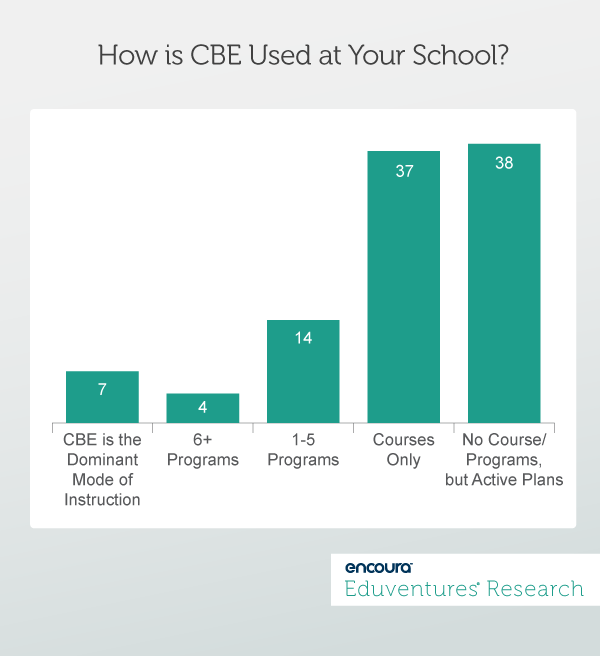In 2016, Eduventures began a three-year inquiry into competency-based education (CBE). In the initial phase of our study, Deconstructing CBE, we found that:
"While there is no shortage of interest in CBE, the real question is: what does this interest amount to?
Is the sector on the brink of a CBE revolution or will CBE quickly return to the margins?
Two years later, where is CBE? Is it still a somewhat ambiguous and broadly-defined innovation? Or have institutions and CBE supporters been successful in articulating scalable best practices?
The National Survey of Postsecondary Competency-Based Education
Eduventures' initial survey of 250 schools suggested that despite their stated interest in CBE, it could be best described as an aspirational innovation: a small number of schools were implementing CBE broadly, while most reported experiments at the program or course level (see Figure 1).
Figure 1
In this context, Eduventures is pleased to announce a new collaboration with the American Institutes for Research (AIR) to conduct the National Survey of Postsecondary Competency-Based Education. With support from the Lumina Foundation and Ellucian, the study will begin June 11. An initial report of current CBE implementation, and how it has changed since Eduventures’ 2016 survey, will provide the most comprehensive analysis of CBE to date.
Why this study, why now? Several recent developments reflect the ongoing debate over whether CBE will grow or not.
Excelsior College Reboots In Response to Completion Challenges
Can students in CBE programs achieve higher exam performance through online instruction and demonstrations of content mastery? Longtime provider of competency-based nursing education and assessment, Excelsior College, has struggled with this question. From 2011-2016 the completion rates of Excelsior's adult learners, particularly among part-time students, precipitously declined. In response, Excelsior has announced a “repositioning” of its programs.
Eduventures’ own review of IPEDS data reveals that during this time, completions in Excelsior’s associate and bachelor’s nursing degrees declined 43% compared to an increase of 10% among all public institutions in New York State. The decline in completions hurt Excelsior’s revenue and reputation as an innovative public institution. It has also raised a broader question: Is online, competency-driven exam preparation a winning combination for part-time adult learners?
To the school's credit, it has recognized that these students require different support systems. Rather than abandoning the premise of CBE, Excelsior appears ready to respond to this setback and make improvements.
Career-Readiness at Western Governors University
schools often hope CBE can deepen career-readiness, particularly for adult learners. In September 2017, Western Governors University (WGU), one of the few schools that can accurately be described as delivering CBE at scale, received a stunning finding from the Office of the Inspector General (OIG).
The OIG determined that that WGU had not complied with the "regular and substantive" requirements of Title IV funding, and that it should repay more than $700 million to the federal government. Would this finding create a “chill” on CBE implementation at WGU and other institutions?
As WGU contests the OIG finding, more recent evidence sheds some light on whether WGU alumni feel they have been prepared for the job market. In 2017, Gallup surveyed WGU alumni who had graduated between 2013 and 2017. Two-thirds of WGU alumni reported that they had benefited from “a mentor who had encouraged [me] to pursue my goals and dreams”--twice the rate of graduates from public, private, and non-profit schools.
Eduventures’ own recent study of alumni who had enrolled in conventional schools as older working adults found far less evidence of career mentorship and lower levels of confidence that their studies prepared them for post-graduate employment.
This recent Gallup data indicates that WGU’s model of career preparation has been popular among its recent graduates. Additionally, the OIG finding may not have had the feared chilling effect: facts on the ground suggest that elements of the WGU career-readiness model are making a difference. Whether this is replicable and scalable, of course, remains an open question.
Will CBE Live Long Under PROSPER?
For dedicated CBE prognosticators, the reauthorization of the Higher Education Act (HEA) through HR 4508, Promoting Real Opportunity, Success and Prosperity through Education Reform, aka the PROSPER Act, remains front and center.
While progress toward passing it has stalled in the Senate, its eventual passage would have a significant impact on postsecondary CBE. Notable provisions include:
- enabling the creation of a regulatory pathway for CBE programs, and presumably entire institutions, to access Title IV funding by relaxing definitions of distance education.
- revising the “regular and substantive” requirement--at the heart of the OIG finding against WGU--which would pave the way for greater CBE growth.
Passage of PROSPER could be a game-changer for CBE. In theory, it could broaden access to federal funds, encouraging a new generation of institutions to create or accelerate CBE experiments. While the latest signals from Capitol Hill suggest that passing PROSPER is unlikely in 2018, stay tuned to see whether Secretary of Education Betsy DeVos opts to enact elements of PROSPER on her own.
The Next Chapter
While CBE has neither returned to the margins nor sparked a higher education revolution, its core premise continues to stimulate widespread debate in higher education:
- Can CBE enable students to earn workplace-ready credentials more quickly and at lower costs?
- Is the financial aid scaffolding of higher education simply too restrictive and resistant to change?
- Will a less-regulatory Department of Education prove to be a catalyst for CBE?
- Will resurgent for-profit schools, including some that have been reborn as non-profits, take up the mantle of CBE?
Timing for the joint AIR/Eduventures study couldn’t be better. For more information on how you can participate, click here.
Once again, we convene some of the most influential thought leaders and practitioners in the industry, as well as the latest data and commentary from our analyst team, to help guide higher education institutions and the companies who serve them.
Visit the Summit homepage and get all the information you need.
Thank you for subscribing!


